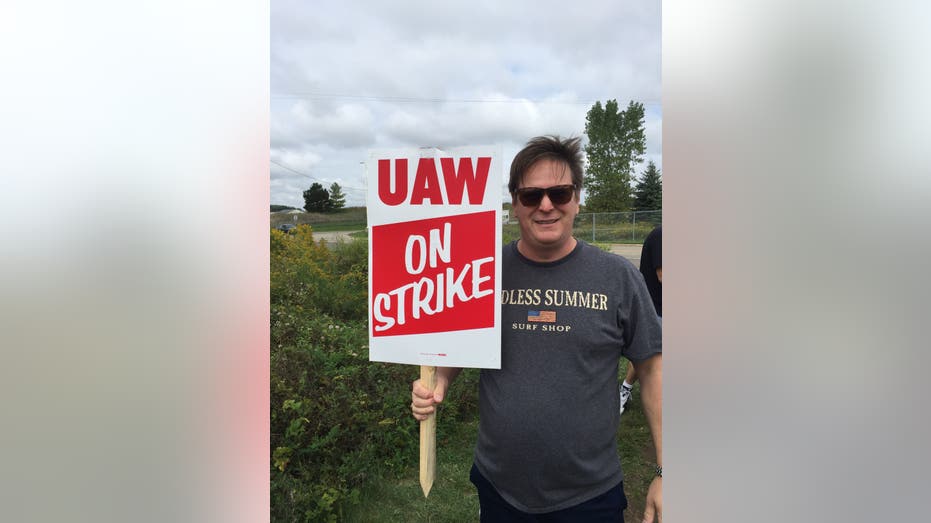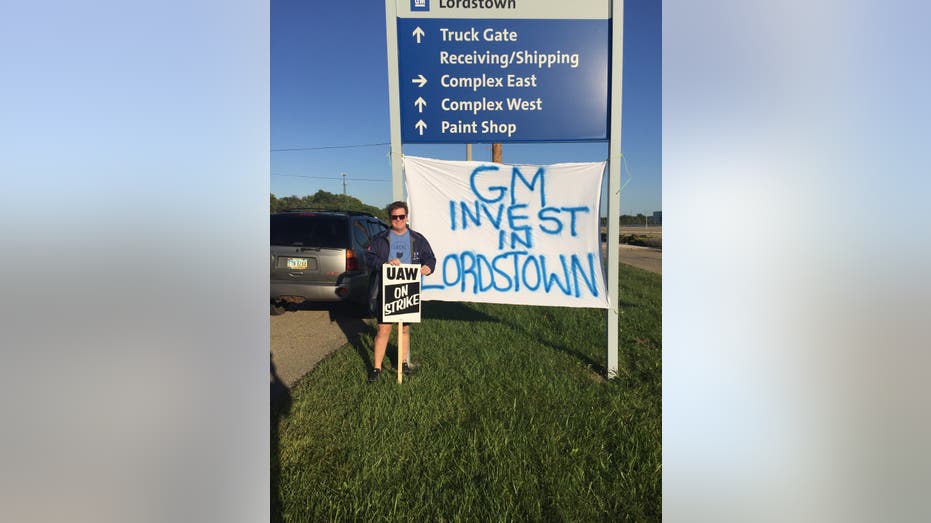GM worker on strike: Taking a stand for temps is personal
For veteran General Motors employee Mike Yakim, striking for GM to make a change by hiring more workers permanently rather than on a temporary basis is personal.
He was hired as a temporary worker at GM right out of high school in 1986 and achieved permanent status in 1994, he told FOX Business. Temporary workers cost the company an average of $15 per hour compared to permanent workers doing the same jobs. Permanent positions start at $17 an hour and progress from there, according to The Wall Street Journal.
"The temporary people, making them permanent, that's a cause that's near and dear to me because I did it for eight years," Yakim said. "Nobody at my local level, or even nationally, stood up."
Yakim raised a family while working at GM, even though he was a "weekend parent" for several years: employed in Lordstown, Ohio, while his wife and teenage son stayed behind in Maryland. He's seen GM from every angle and can talk at length about "Aunt Mary" (GM CEO Mary Barra) and the company's "hat in hand" request for a bailout in 2008.

GM employee Mike Yakim on the picket line outside of the the Lansing Delta Township plant. Courtesy of Yakim
Yakim plans on retiring at GM and said he wants the UAW to hold out in negotiations so that more GM workers get that chance, too.
"To leave these younger people, temporaries out there dangling, in the wind, man, I was dangling in the wind for eight years,' he said. "I don't want nobody to dangle. I know what it's like to be laid off on Thanksgiving."
GM counters that employing temporary workers is good for permanent employees, enabling them to take time off. It also gives the company flexibility to scale up production for new models and combat employee absenteeism.
The company relies on a small cadre of temporary workers, about 7% of its U.S. workforce. Many foreign auto companies with assembly plants in the U.S. rely on more than double that number.

GM employee Mike Yakim on the picket line in Lordstown, Ohio. Courtesy of Yakim
Still, temporary workers' situation is a sticking point in the negotiations between GM and the UAW, which does represent temps in addition to permanent hires.
Yakim said improving temps' paths to permanent positions as doing the right thing since the company enjoys a healthy profit.
"[Temps] don't get the same benefits. They don't have the same retirement plan. They make, in some cases, half the wage I make," he said, adding that temp workers have to make ends meet in areas where home prices, lawyers' fees and even restaurant meals reflect what permanent employees like him can afford.
Yakim's experience on strike duty has been a little bit different from that of his coworkers: he picketed on Monday at his current plant, Lansing Delta Township. He drove to Lordstown to picket on Wednesday after the local union put out the call for more people to demonstrate outside of the recently shuttered plant.
What does Yakim want from GM? He wants "specifics," he said, not just numbers. To him, GM's promise to invest $7 billion GM in the U.S. is not good enough — he wants specific deadlines and places for the money.
In fact, there are doubts that all of that money will go to plants where employees make the full UAW wage of $30 an hour, according to a report from the Associated Press.

Picketing union members stand-off with a semi-truck attempting to enter the GM Davison Road Processing Center. United Automobile Workers remain on strike against GM on Tuesday, Sept. 17, 2019 in Burton, Mich. (Sara Faraj/The Flint Journal via AP)
Yakim plans to be in Lansing next week if the strike is stil going on, and acknowledges he's one of the lucky ones who can fall back on savings. He's no stranger to being on strike: Yakim participated in a local strike in Baltimore in 1991 as well as the two-day nationwide 2007 strike before the auto industry bailout.
CLICK HERE TO READ MORE ON FOX BUSINESS
"We as a union gave concessions, did our part and said when you get back on your feet we’ll discuss it. Everybody's going to benefit. ... Now [GM] spits in the face of the American taxpayer. They spit in the face of the men and women who have made them these billions of dollars," Yakim said.
Meanwhile, the fallout from the UAW strike at GM isn't limited to the carmaker and its employees. The disruption on assembly lines has created a supply-chain backlog, forcing vendors to lay off their own laborers as work dries up.




















